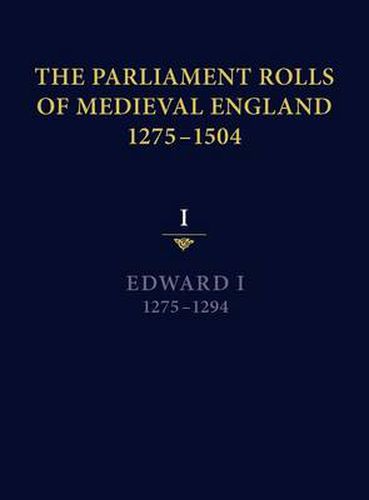Readings Newsletter
Become a Readings Member to make your shopping experience even easier.
Sign in or sign up for free!
You’re not far away from qualifying for FREE standard shipping within Australia
You’ve qualified for FREE standard shipping within Australia
The cart is loading…






The rolls of parliament were the official records of the meetings of the English parliament from the reign of Edward I (1272-1307) until the reign of Henry VII (1485-1509), after which they were superseded by the journals of thelords, and, somewhat later, the commons. The rolls presented here cover the first years of the rule of Edward I, whence the first records of parliament survive. During his reign parliament gained a new importance and centrality inthe lives of the king’s subjects - in part a result of the king’s decision to encourage his subjects to submit written petitions to parliament, in part because of the role parliament played in the drafting and approval of a majorprogramme of legislative change, in part because it was largely in parliament that the king obtained consent to the levying of the taxation that was required for his major military expenditure.
This new edition of the documents is presented with the first ever translation, together with related materials; it also includes a discussion of all the known parliaments of the reign.
Professor Paul Brand is Senior Research Fellow and Senior Dean, All Souls College, Oxford
$9.00 standard shipping within Australia
FREE standard shipping within Australia for orders over $100.00
Express & International shipping calculated at checkout
The rolls of parliament were the official records of the meetings of the English parliament from the reign of Edward I (1272-1307) until the reign of Henry VII (1485-1509), after which they were superseded by the journals of thelords, and, somewhat later, the commons. The rolls presented here cover the first years of the rule of Edward I, whence the first records of parliament survive. During his reign parliament gained a new importance and centrality inthe lives of the king’s subjects - in part a result of the king’s decision to encourage his subjects to submit written petitions to parliament, in part because of the role parliament played in the drafting and approval of a majorprogramme of legislative change, in part because it was largely in parliament that the king obtained consent to the levying of the taxation that was required for his major military expenditure.
This new edition of the documents is presented with the first ever translation, together with related materials; it also includes a discussion of all the known parliaments of the reign.
Professor Paul Brand is Senior Research Fellow and Senior Dean, All Souls College, Oxford